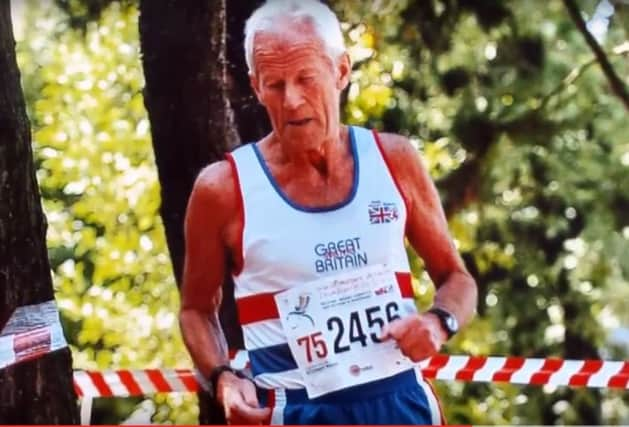Obituary: William Stoddart, athlete


Bill Stoddart, who has died aged 84, was one of Scotland’s top distance runners, excelling over track, road and country, particularly as a veteran athlete. In that category he won a clutch of Scottish, British and world titles while also setting a number of world’s-best times over a range of distances in different age groups. A life member of Greenock Wellpark Harriers (later Inverclyde Athletic Club), he first came to prominence in 1969 aged 38 when, in only his second attempt at the distance, he won the Scottish marathon title.
The race was to be run as a rehearsal over the course for the 1970 Commonwealth Games in Edinburgh and started from a half-completed Meadowbank Stadium where the 23 runners were cheered off on a very hot day by a few construction workers. The Lord Provost started the race after two false starts as the gun failed to fire before the athletes headed towards Longniddry, where they turned round to come back.
Advertisement
Hide AdAdvertisement
Hide AdTowards the finish an official tried to tell Stoddart his time but, by now exhausted, he replied: “Just tell me the miles to Dundee” (per the song).
He crossed the line about three quarters of a mile ahead of the runner-up to complete an excellent season, having won a silver medal in the Scottish ten-mile championship weeks earlier. He remained at the forefront of Scottish marathon running for some time, winning a silver medal in the national championship in 1971.
He also enjoyed much success in road races and cross-country, winning several international vests in that latter discipline. In 1970 and 71 he won his district title, each time leading Wellpark to the team award, while in 1970 he was delighted to be selected for the Scottish team to run in the world cross-country championships in France, considering it “a huge honour” to be in the same team as runners like Jim Alder, Lachie Stewart, Ian McCafferty and others.
At this time, Scotland had a “wealth of riches” in distance and cross-country running, other top names including Donald McGregor, Fergus Murray and Alistair Blamire.
In 1974, after losing a year to injury, Stoddart decided to concentrate on veterans’ athletics, or Masters, as it is now known. For almost 30 years he harvested a bumper crop of world titles and world best times at distances on track and road from 10k to marathons, while also collecting world cross-country titles at venues all over the globe.
One domestic success he particularly enjoyed was winning the inaugural 1981 Inverclyde marathon from a field of 500, narrowly missing the world best for a 50-year-old.
He won so many titles that he confessed “he couldn’t recall them all” but 1992 was an excellent year. At the world veterans’ road race championships in Birmingham he won gold in the over-60s 10k and 25k; at Arbroath he ran a world best time in the half marathon while at East Kilbride he set a world ten-mile best and earlier that year set a world 10k best.
Colin Youngson, three time Scottish marathon champion, said: “I think he’s the best veteran athlete Scotland has ever had. He just kept winning world titles and setting world bests. A great man, he was always cheerful and supportive, very well liked.”
Advertisement
Hide AdAdvertisement
Hide AdOne of five children, his family was evacuated to Mull during the war. On leaving Mount School, Greenock, he did an engineering apprenticeship in Kincaid’s works.
His main sporting interests then were table tennis and playing football for Port Glasgow Rovers. It was while on national service with the RAF in Germany that he started to run, continuing to do so when demobbed and joining Greenock Glenpark Harriers. Once back from Germany he married Betty, who also worked at Kincaid’s and whom he had met five years previously at a dance in Greenock YMCA. They enjoyed a long and happy marriage.
Running continued to be just a leisure activity until he started training seriously in about the mid-1960s, encouraged by former champion Andy Brown. Although Stoddart said he had no regrets, he thought he could have done more if he’d started earlier. Always keen to improve himself, in his late 50s he added deep water treading in the swimming pool to his training regime, reckoning his “times got faster every year since”.
He was also keen to improve himself away from running. Conscious that the war years had hampered his education, he completed a BA Hons degree from the Open University followed by an MSc from Strathclyde University in industrial relations and management.
That led to his entering teaching, firstly at Reid Kerr College in Paisley and then at James Watt college in Greenock, where he headed the management and industrial studies department. After early retirement he and a colleague set up a consultancy business which they ran successfully for five years before he retired permanently in 1993.
Betty and he enjoyed spending winters in Spain, where he continued running while, according to Betty, she was “his bag lady”.
Here, apart from his athletics commitments, he was a member of the Childrens’ Panel and was involved in the campaign to erect the Finlaystone Monument to the 2nd Battalion of the Argyll and Sutherlands .
His son Donald, a retired GP, recalled: “He was an inspiration to many and never accepted being told ‘you can’t do that’. He was a wee guy but had the heart of a lion.”
Advertisement
Hide AdAdvertisement
Hide AdStoddart had an unquenchable passion for running for its own sake and liked to say that “it was all for glory” and that had never made a cent out of it. When asked the secret of his success, he replied: “Dedication.”
Latterly he suffered from Alzheimer’s disease, which led to his death. He is survived by wife Betty, son Donald, daughter-in-law Jo and two grandchildren, Jack and Thomas.